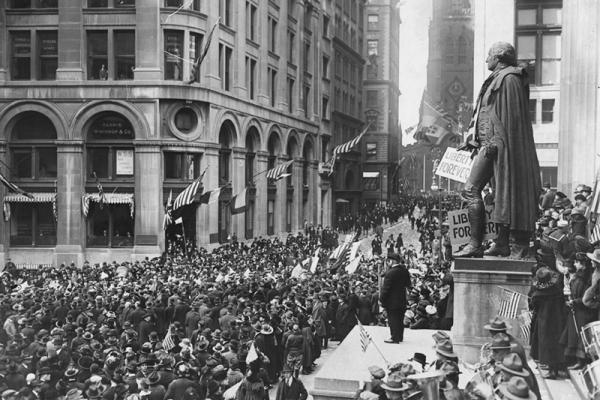Before Veteran’s Day was Veteran’s Day, it was Armistice Day.
On the 11th hour of the 11th day of the 11th month in 1918, the cessation of hostilities of World War I took effect.
It was supposed to be the end of the "war to end all wars."
In 1926, Congress passed a resolution to commemorate the day “with thanksgiving and prayer and exercises designed to perpetuate peace through good will and mutual understanding.”
In 1938 the day became known as “Armistice Day” with the intent that it would be a day dedicated to the world peace.
In 1954, after World War II, when the world stood in horror at the sight of the Nazi genocide machine and ghastly bombings of civilian populations culminating in the first ever deployment of nuclear bombs, the day became known as Veteran’s Day — a day to honor military service.
I say if we are to truly honor veterans, we ought to remember and honor Armistice Day with the hope that we can bring an end to violent conflict within and between nations.
In 1795, German philosopher Immanuel Kant wrote an essay titled, “Toward Perpetual Peace: a Philosophical Sketch.” He wrote it on the occasion of the signing of the Treaty of Basel that ended hostilities between Prussia and France.
Kant considered the peace agreement to be what peace theorists today would call a negative peace. It ended hostilities, but did not set the two nations on a path to friendship.
In the essay, Kant argues that the “natural” state of humankind is war, thus, if humanity will ever have perpetual peace outside the confines of the graveyard, we must “establish” it. Humanity ought to be intentional about creating peace.
Kant goes on to outline what is necessary to establish perpetual peace between nations. He writes of a cosmopolitan ideal, the notion that the various nations and cultures of humanity compose a universal community, and at some point the nations of the world ought to join in a federation to live under a global system of laws. He also notes that the system of government most likely to help establish perpetual peace is a constitutional republic.
Kant understands a republic as that system of government where the legislative and the executive functions of government are separate.
Freedom, equality and a single, common legislature are basic elements of such a political organization. Kant reasons that in that kind of political system it would be difficult for nations to go to war. Citizens would object.
He writes: “If the consent of citizens is required in order to decide that war should be declared. ... Nothing is more natural than that they would be very cautious in commencing such a poor game, decreeing for themselves all the calamities of war.”
These calamities include the cost in blood and treasure, national debt, and repair of the devastation.
I say add to that the psychological and soul devastation of warriors and their families.
Much of what Kant theorized has come to fruition in the Universal Declaration of Human Rights, the establishment of the United Nations and the International Criminal Court.
We are still working toward the day when ordinary people will not be bamboozled into supporting useless war.
It is right that our elected leaders hear the voice of the people calling for the end of America’s military presence in both Iraq and Afghanistan.
This is the reason representative democracy may help the world achieve perpetual peace.
And this is what we ought to remember and to strive for on Armistice/Veteran’s Day.
 Dr. Valerie Elverton Dixon is an independent scholar who publishes lectures and essays at JustPeaceTheory.com. She received her Ph.D. in religion and society from Temple University and taught Christian ethics at United Theological Seminary and Andover Newton Theological School.
Dr. Valerie Elverton Dixon is an independent scholar who publishes lectures and essays at JustPeaceTheory.com. She received her Ph.D. in religion and society from Temple University and taught Christian ethics at United Theological Seminary and Andover Newton Theological School.
Got something to say about what you're reading? We value your feedback!
